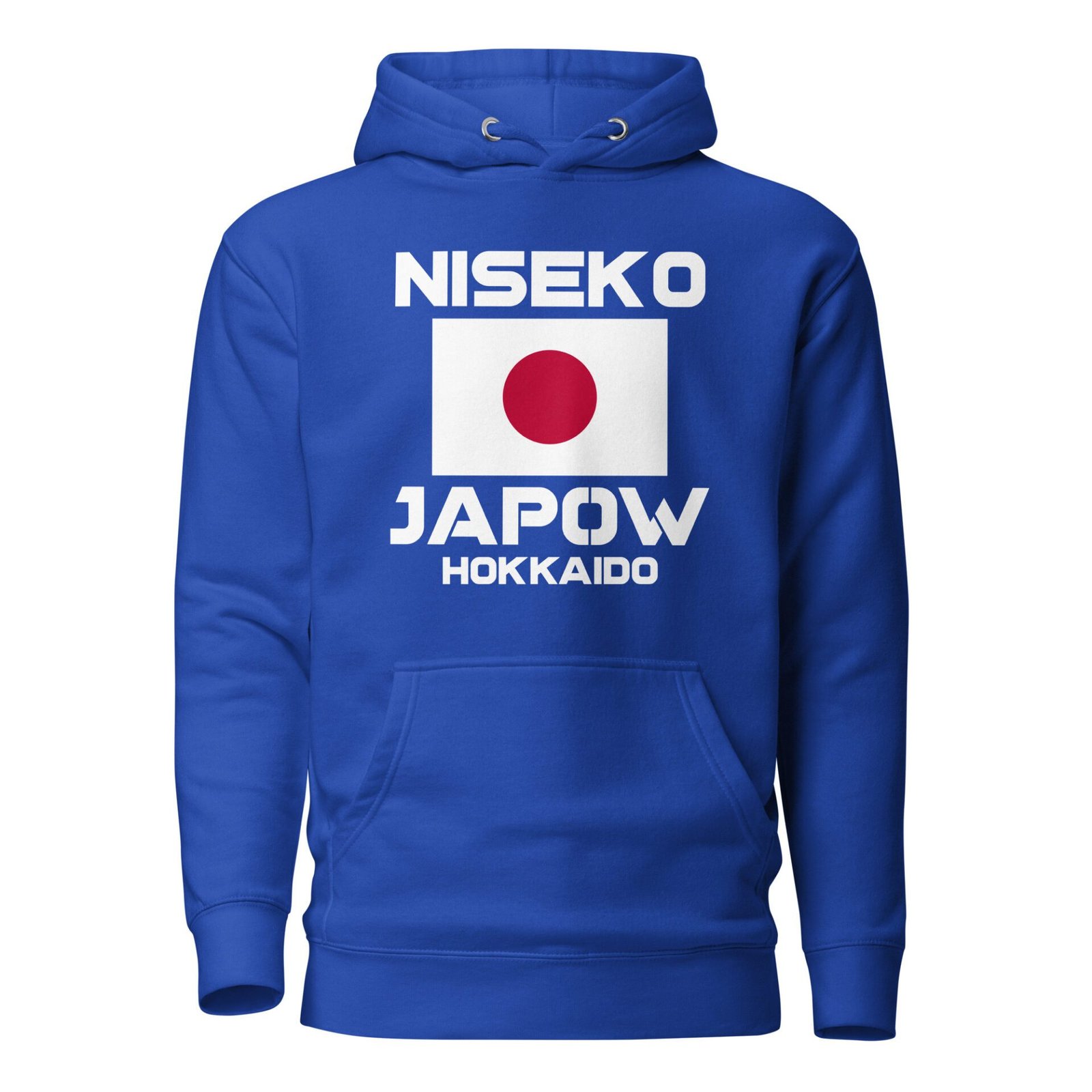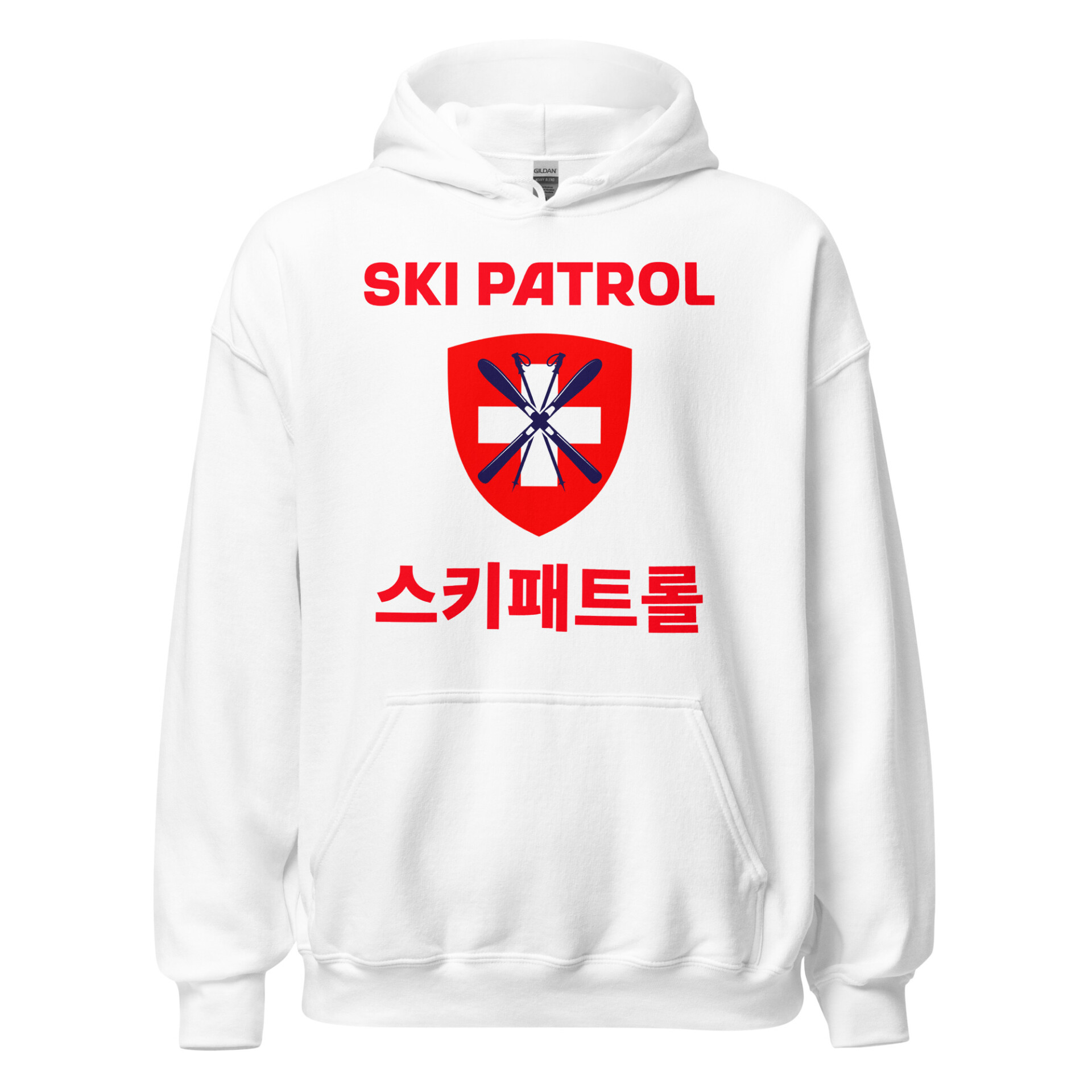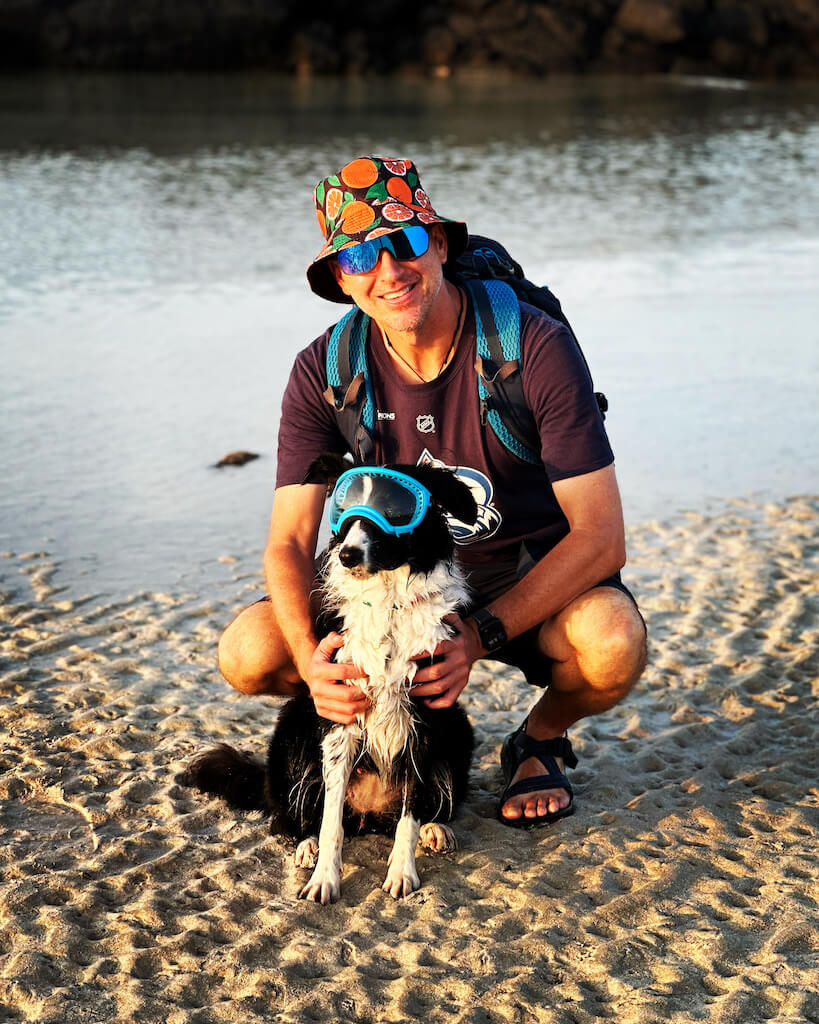Quick heads up: This post may contain affiliate links to gear, hotels, flights, or experiences I’ve used or genuinely recommend. If you book through one, I may earn a commission at no extra cost to you. Full disclosure here.
Muju Deogyusan Resort in North Jeolla Province (Jeollabuk-do) offers a unique skiing experience in South Korea’s scenic Deogyusan National Park.
🏔️ Why Ski Muju Deogyusan Resort in 2025/26?
If you’re looking for a ski day that doesn’t require a long drive to Gangwon-do, Muju Deogyusan Resort is one of the best options in South Korea’s southern region. Set inside Deogyusan National Park, it offers scenic slopes, relaxed crowds, and a welcome break from the mega-resort energy you’ll find farther north.
I visited most recently in December 2023 and again in early 2025. While the terrain was still limited both times, the resort had a chill, no-rush vibe that reminded me of Ski Cooper back in Colorado. It’s a little dated and a little quirky, but still a good time if you manage your expectations.
If you’re an advanced skier or planning a full-on Korean ski trip, Yongpyong and High1 are still better picks for terrain variety, snow quality, and infrastructure. But if you’re based in Daegu, Daejeon, or even Busan, and just want to get some turns in without committing to a four-hour haul, Muju is a solid and convenient choice.
In this guide, I’ll cover everything you need to know to plan your trip: transportation options, lift tickets, gear rentals, lodging, and what to expect on the slopes.
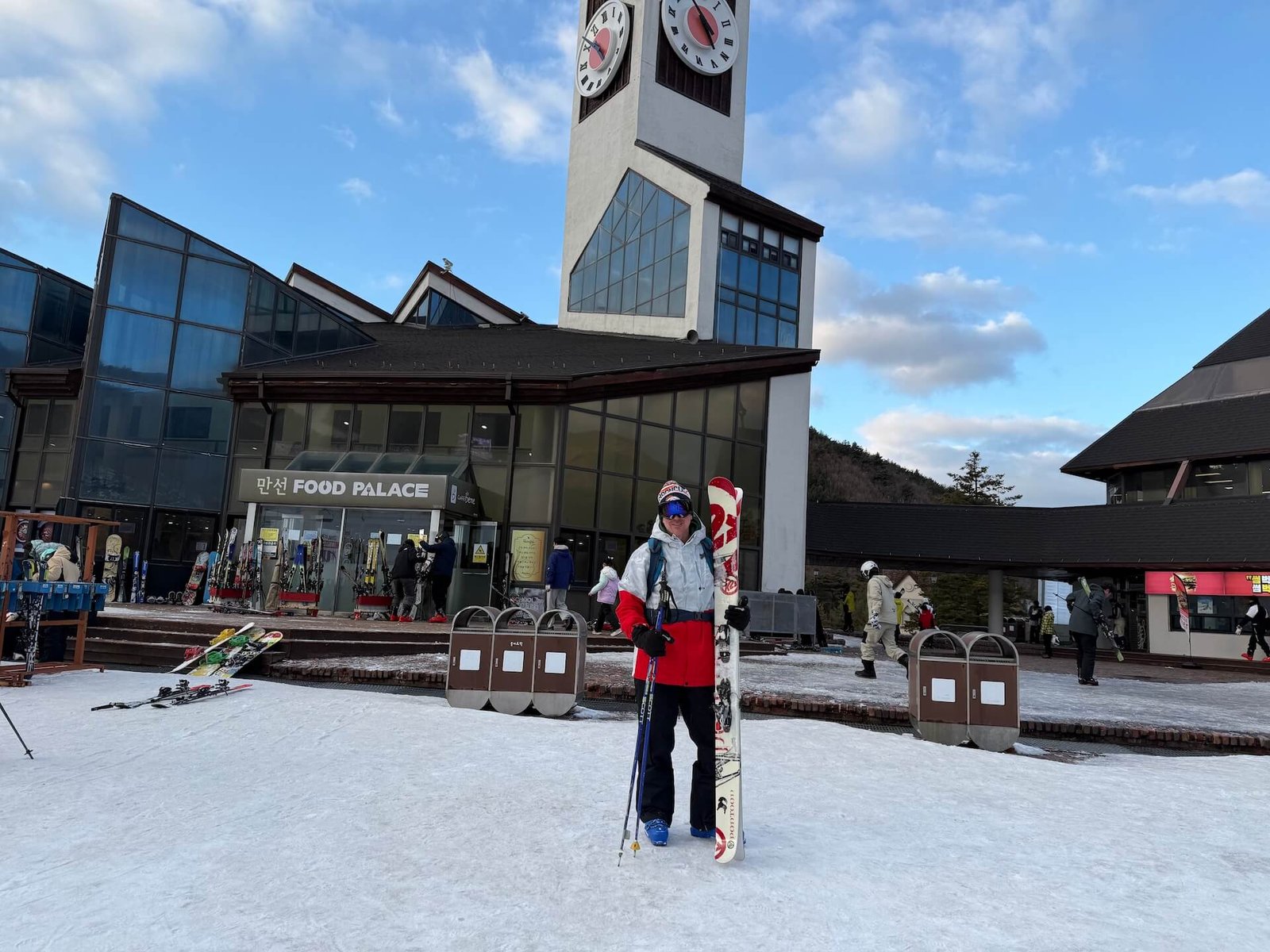
🙋♂️ About Colorado Saram
I’m a Colorado native, raised in the mountain town of Vail, now living in Daegu, South Korea since 2007. My passion for adventure travel brought me to South Korea, where I now work as an English teacher and explore Asia’s landscapes, ski slopes, and hiking trails.

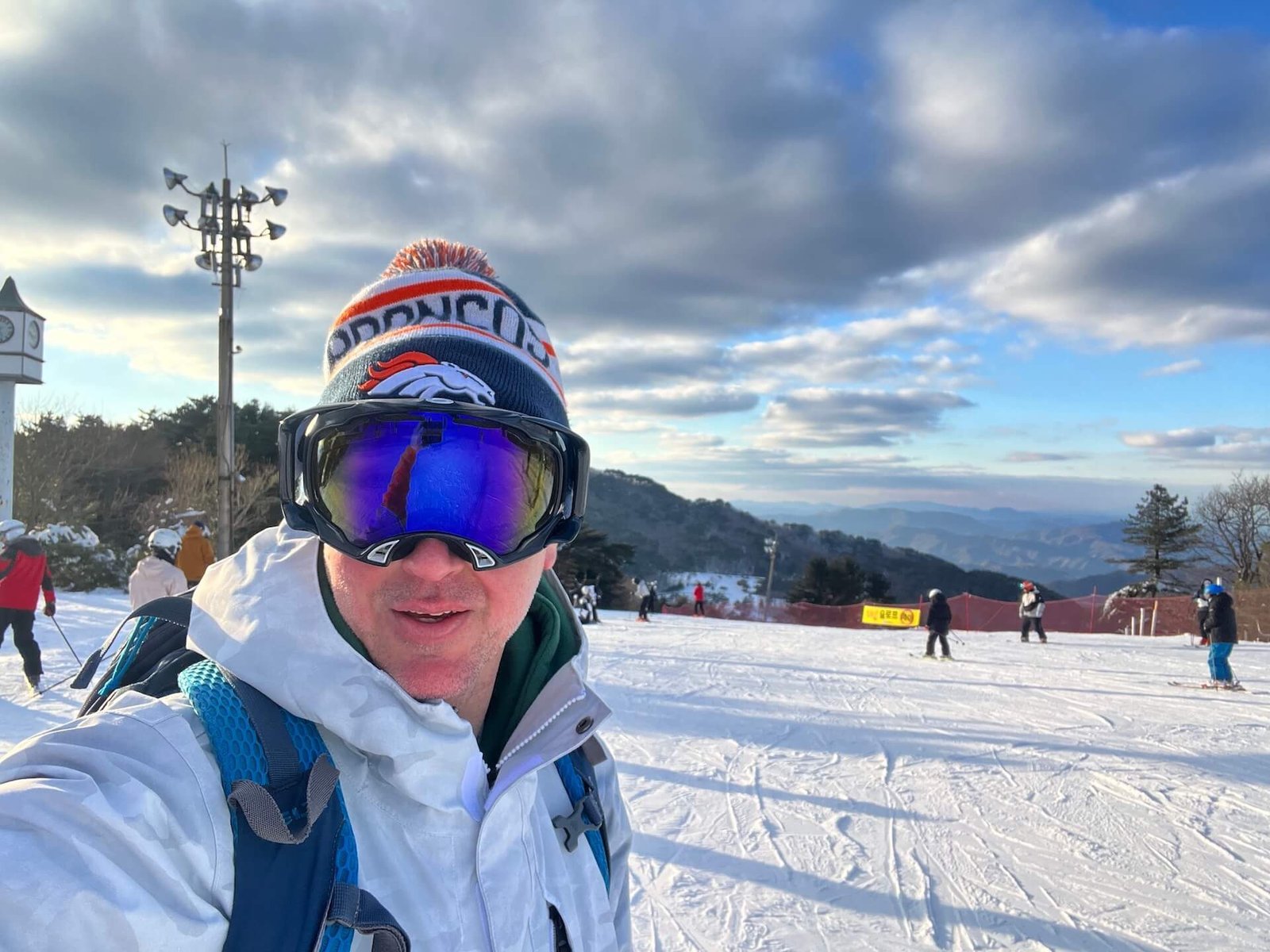
🛻 How to Get to Muju Deogyusan Resort
Muju isn’t the easiest place to reach, especially if you’re relying on public transportation or trying to plan your trip from outside Korea. Unlike the bigger resorts near Seoul, there aren’t many (if any) reliable package tours or English-friendly shuttle options available online. If they exist, they’re likely advertised through Korean-language platforms or coordinated by local tour groups.
If you’re serious about skiing at Muju, your best option is to drive yourself or rent a car for the trip. That gives you full control over your schedule and makes the logistics around gear, food stops, and pets much easier to manage. Muju is tucked into a rural pocket of Jeollabuk-do, and while buses can get you to nearby towns, transfers from there to the resort are limited and time-consuming.
For my crew (my wife, our dog, and me) the drive from Daegu takes about two hours with one rest stop. If you’re coming from Seoul, expect closer to 3.5 to 4 hours depending on traffic.
Navigation Tip:
Use the following address in your GPS or KakaoMap app:1299-1 Simgok-ri, Seolcheon-myeon, Muju-gun, Jeollabuk-do
Pet-friendly note:
Most Korean rental cars are fine with well-behaved dogs as long as the car comes back clean. If you’re traveling with a pet, it’s still worth double-checking the policy when you book.
If you’re not comfortable driving in Korea or don’t have a valid license, your best bet may be to ask a Korean friend or coworker if they know of a local tour or package option. Some regional offices or clubs do run seasonal ski trips, but they’re rarely advertised in English.
Related: Driving in Korea as a Foreigner
📍 Based in Busan and want to hit the top resorts instead?
If you’re starting in Busan but thinking about Yongpyong, High1, Phoenix, or Alpensia, this private Klook transfer is a solid option for private transportation. It includes pickup from your Busan hotel or airport, custom vehicle options for groups, and a pro driver to get you there comfortably.
👉 Book a Busan Private Transfer to or from Major Ski Resort
👉 If you’re not committed to Muju, other ski and snowboard deals are available on Klook for numerous other resorts and winter activities across Korea.
📊 Muju Deogyusan Resort Overview and Terrain Stats
Muju Deogyusan Resort is one of Korea’s largest ski areas by surface area, with scenic slopes spread across two base zones inside Deogyusan National Park. The resort caters to all skill levels, though intermediate terrain makes up the biggest share.
Here’s a quick overview of the resort’s key stats:
- Skiable terrain: 21.8 km (13.5 miles)
- Longest run: Silk Road – 6.1 km (3.8 miles)
- Lifts: 1 gondola, 12 chairlifts, 2 magic carpets
- Base elevation: 724 meters (2,375 feet)
- Summit elevation: 1,529 meters (5,016 feet)
- Nearby towns: Simgok-ri and Seolcheon-myeon (3.2 km each)
📍 Muju Resort Trail Map
For a sharper view of the map, you can download the Muju Deogysan Trail Map.
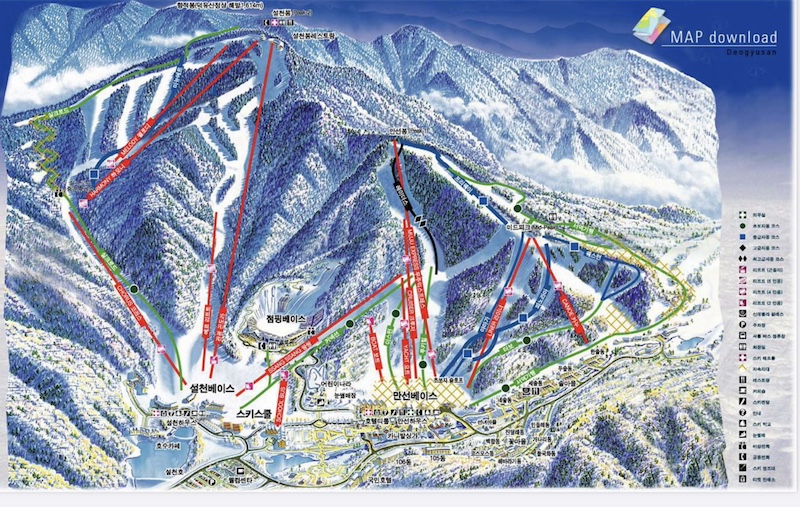
🗺️ Terrain Breakdown by Skill Level
Muju Deogyusan Resort caters to all skill levels.
- Beginner: 4.8 km (22%)
- Intermediate: 10.3 km (47%)
- Expert: 6.7 km (31%)
🟢 Beginner Terrain
Right in front of the Manseon Base Area, you’ll find the dedicated beginner zone. There’s a small learning area with a magic carpet that’s ideal for first-timers who aren’t ready to load a lift.
From Manseon, you can also access the Boat and Yacht chairlifts, which lead to wide, mellow runs on the eastern side of the mountain. It’s a good place to warm up or help someone learn to link turns without pressure.
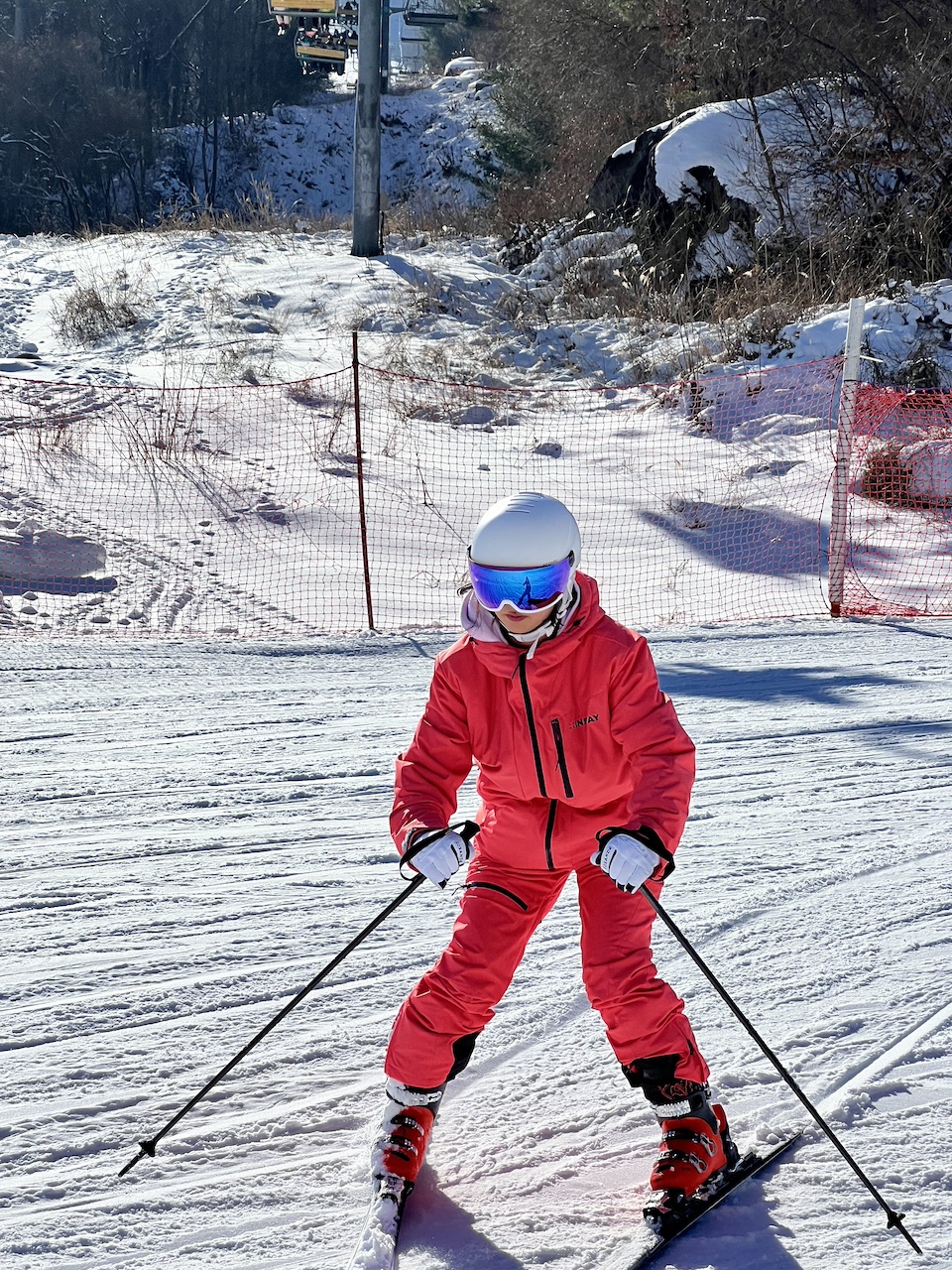
🔵 Intermediate Terrain
I found the best intermediate skiing at Muju off the Liner Lift. During my early-season visit, the upper mountain was still closed, but I was able to get in solid laps on the Sundown and Turbo slopes. Crowds were light, and I had enough room to open it up and let it fly.
Liner also accesses the expert Yamaga and Panorama trails, but those weren’t open during my December trip. I’ll touch more on that in the next section.
I also checked out the Cruiser and Muju Express lifts. Don’t let the names fool you. Both are painfully slow, and I spent more time sitting than skiing. If you want consistent runs without long lift rides, Liner is your best bet.
📹 Take a Run With Me at Muju
Curious what a full run at Muju looks like? Here’s a POV clip from one of my laps off the Liner Lift. The run starts near Heidi House and finishes at the Manseon Base Area, where I jumped back in line for another lap.
⚫️ Expert Terrain
There’s no real “backcountry” skiing in Korea, but most resorts, Muju included, offer a few steep and icy pitches that will keep your edge control honest.
At Muju, the expert zone sits above Seolcheon Bong (Peak). You can reach it via the Gondola, then transfer to the Harmony and Melody chairlifts for access to higher-elevation terrain.
That’s the theory, at least. This area was closed during both my visits in December 2023 and January 2025, and it’s unclear how often the resort actually opens the upper mountain. When it is open, it definitely adds more to the intermediate and expert experience.
If you want to see what’s open before you go, the resort technically has live webcams and they worked for me in 2023. Though as of 2025, none of them seem to work on any browser I’ve tried. Let’s just say I won’t be nominating their official website for any ski industry awards anytime soon.
🎟️ Muju Lift Ticket Prices and Ski Hours (2025/26)
The lift ticket info below is current as of December 2024, pulled directly from Muju Deogyusan Resort’s official website. Assuming they ever get around to updating it, I’ll do my best to reflect those changes here.
As someone who used to work in ski resort PR back in Colorado, I’ll just say this: Muju’s marketing department isn’t exactly Vail Resorts. Let’s just say I’m not holding my breath for a clean mobile experience, working webcams, or current pricing anytime soon.
That said, here’s what you need to know about ticket prices and how to avoid overpaying.
🕒 Lift Hours
- Early Morning: 07:00–10:00 (weekends and holidays only, except Lunar New Year’s Day)
- Morning: 09:00–16:30
- Afternoon: 12:30–16:30
- Evening: 18:30–22:00
- Night: 21:00–24:00
- Combo (8PM–Night): 20:00–24:00
💰 Official Lift Ticket Prices
This chart is from the resort’s website and includes both lift-only and lift + gondola pricing across multiple time blocks. Prices are in KRW and broken down by category (general public, members, and foundation).
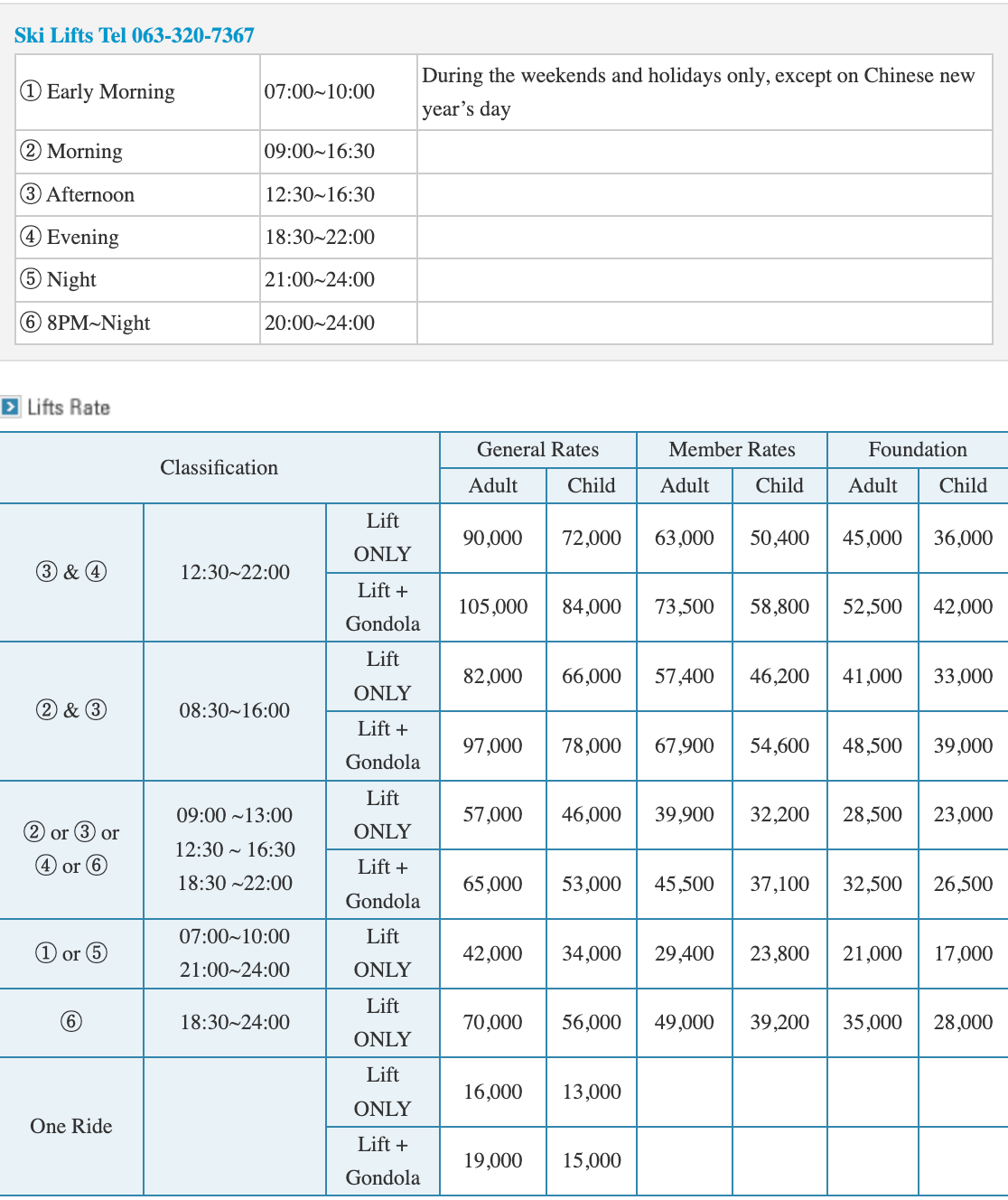
As you can see, it’s… a lot. If your head is spinning from the chart, you’re not alone. That’s one reason I don’t recommend buying your lift tickets at the base, especially if you’re trying to keep costs down.
🏷️ How to Save on Muju Lift Tickets
If you’re driving to the resort, your best bet is to buy tickets through a local rental shop in Seolcheon-myeon, about 3 km from the base area. These places often sell discounted lift passes if you rent gear with them or ask in advance.
Last season, we scored morning lift tickets (09:00–13:30) for just 44,000 KRW, which is significantly cheaper than the posted resort rate.
⚠️ Just be aware: most rental shops only accept bank transfer, so have a Korean bank app or cash-ready friend if you’re going this route.
Most shops, like the one listed below, also sell discounted lift tickets. Just ask!
🎿 Muju Ski Rentals: What to Expect
You can rent everything you need at Muju, whether you’re showing up in jeans and sneakers or just need a helmet. Most skiers on package tours get their gear at the base area. But if you’re driving in, I highly recommend renting from one of the shops in Seolcheon-myeon, about 3 km from the resort.
We chose Top Ski (64 Manseon 1-ro, Seolcheon-myeon), mostly because it looked cool from the outside. That turned out to be a solid decision.
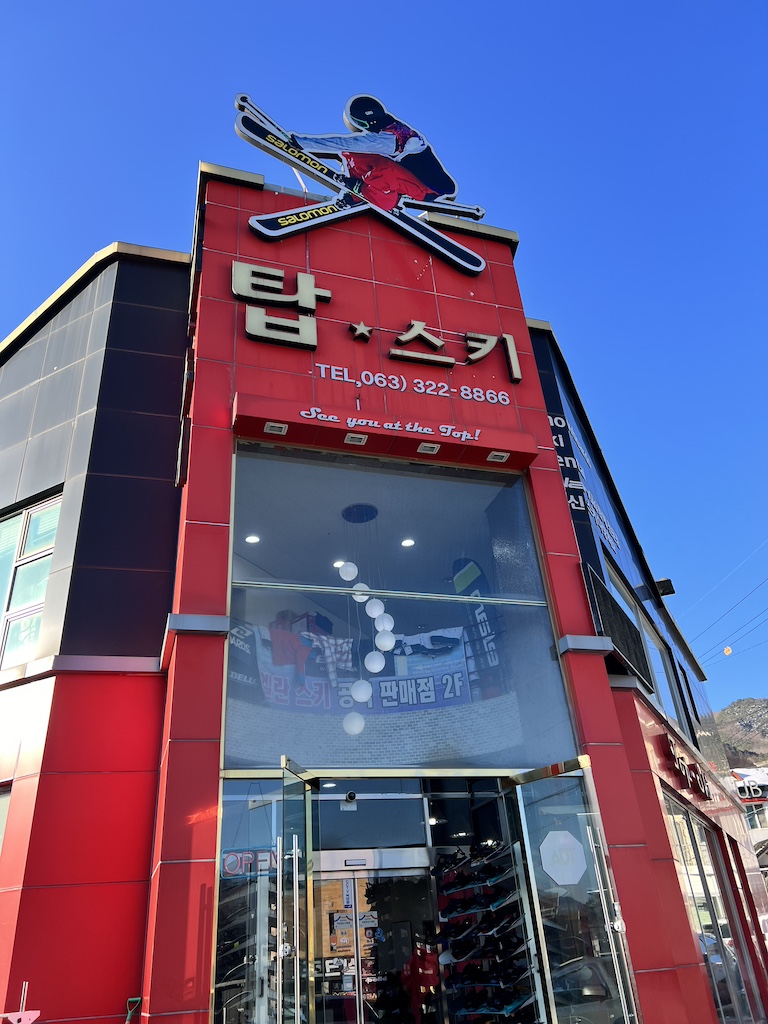
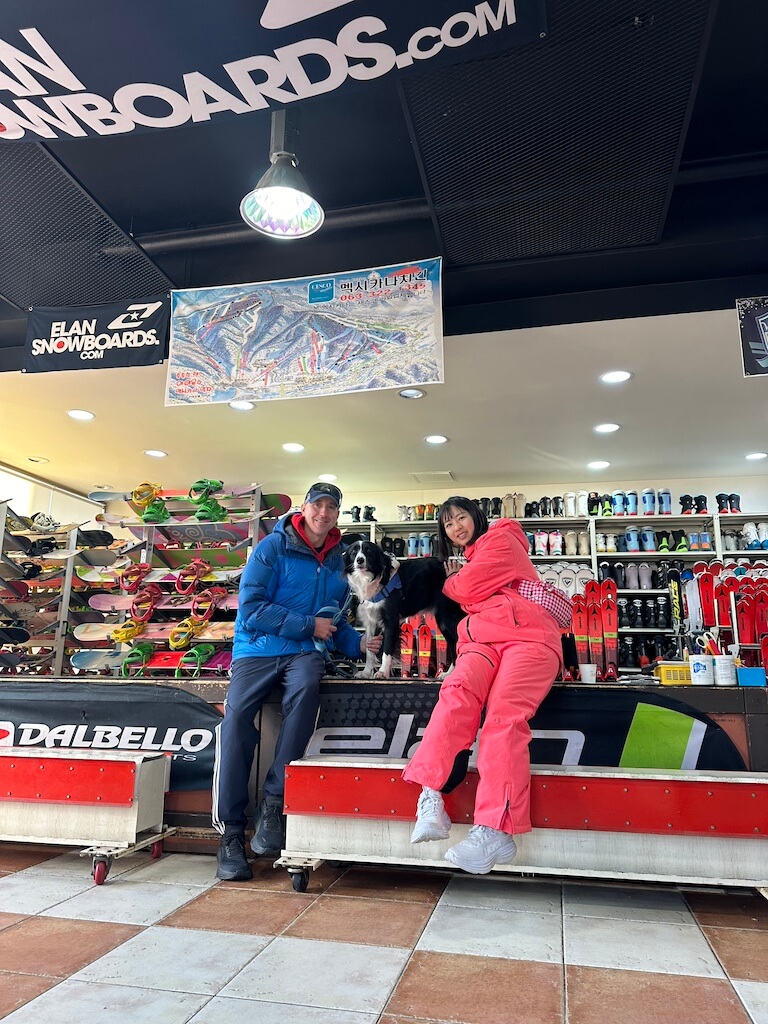
I’m a self-declared gear snob and usually hate everything about rental skis. But Top Ski surprised me. The Atomic Race SLs they gave me were in great shape, and the whole setup felt freshly tuned. Sure, the longest skis they had were 168cm, which are much shorter than I typically ski, but welcome to skiing in Korea.
Even more impressive were the boots they rented to my wife. I’ve seen plenty of Korean rental shops hand out junk (looking at you, rear-entry clunkers), but these were legit Atomic boots that actually fit her well. Probably nicer than she needed, but it was refreshing to see a shop not cutting corners.
There are several rental shops along the road into town. If you’re driving in, feel free to pick whichever one calls to you. Just know that most of them don’t take credit cards. You’ll likely need to pay via Korean bank transfer or bring cash.
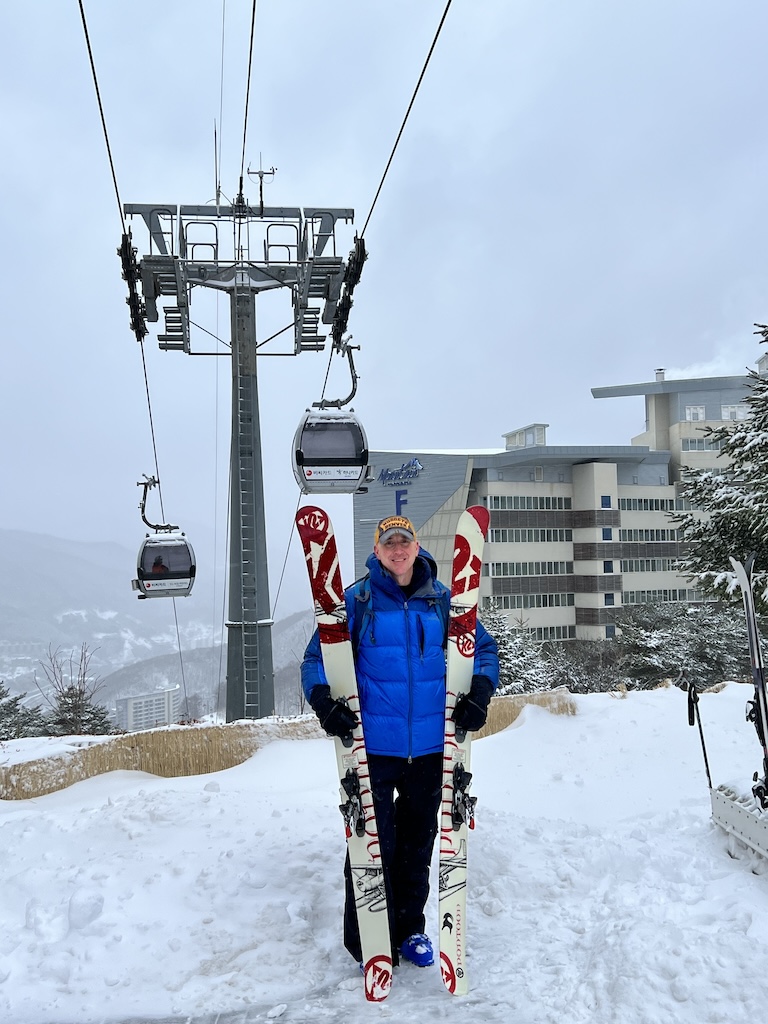
❄️ Season and Snow Conditions at Muju
Muju officially lists its ski season as running from early December to mid-March, but actual terrain availability can be hit-or-miss — especially early in the season.
Based on my own visits and a good conversation with a Korean guy on the lift who seemed to know what he was talking about, Muju doesn’t appear to be aggressively running snowmaking equipment. Whether that’s a resource issue or a lack of commitment is hard to say.
During my December trip, only a fraction of the trails were open despite freezing temps the week before. The rest didn’t look anywhere near ready. I didn’t see a single snow gun running, and there was no sign that the resort was pushing to get more terrain open.
The local I rode the lift with chalked it up to climate change and limited budget. Honestly, he might be right.
All that said, if you show up with a “beggars can’t be choosers” attitude, you’ll still get your turns in and probably have a great time. Just don’t expect full operations in the early season unless there’s been a major storm cycle.
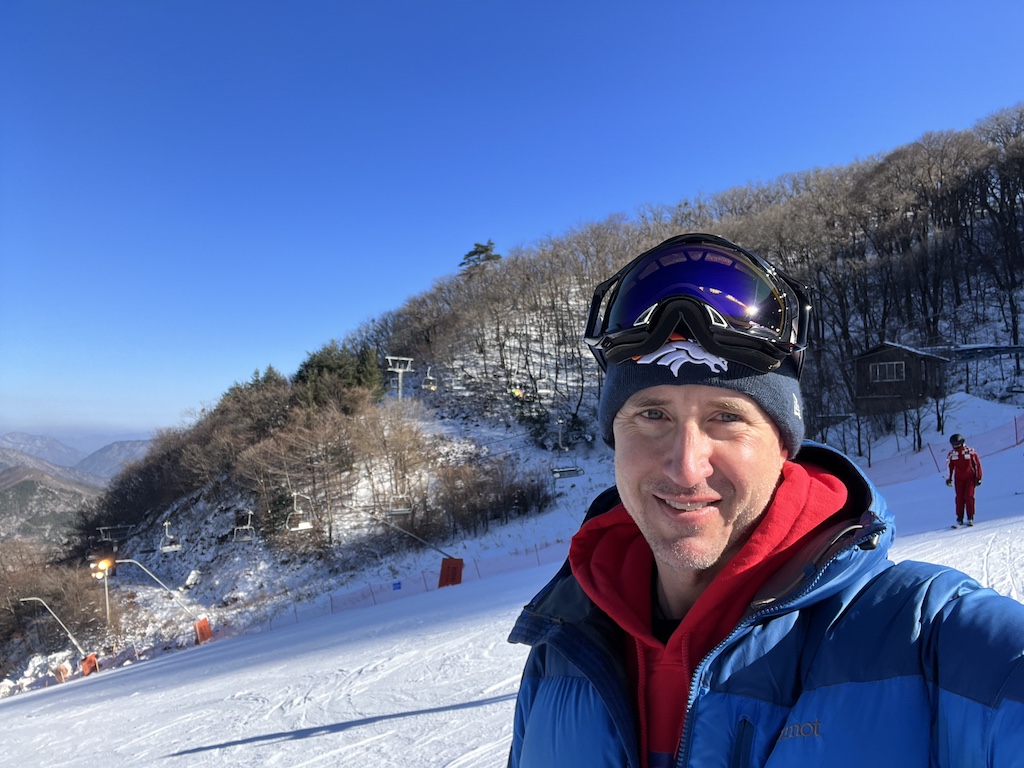
🅿️ Parking & Base Area Tips
Driving to Muju is easy. Parking at Muju can be a bit of a head-scratcher.
When we first arrived, we pulled into the lower lot and quickly realized something was off. Everyone else getting out of their cars was wearing jeans and puffer jackets, not ski gear. Turns out, those lots are mostly for national park visitors, not skiers.
Here’s how to avoid the same mistake.
Keep driving past the lower lots and head toward the Manseon Base Area. There are several smaller lots along the road. We found a free spot near the slopes and were able to boot up at the car and ski down to the lifts, which is always the goal.
Once you’re in the Manseon base area, lift ticket windows are located along the roadside. If you’re renting from a shop in town, you’ll already have your ticket. If not, be prepared for higher prices and longer lines.
Muju’s layout isn’t huge, but it helps to get your bearings early. The Manseon side is best for beginners and families. The Seolcheon side is where you’ll find access to the gondola and steeper terrain. Just know that part of the mountain is rarely open.
🚦 Weekends, especially in mid-season, get much busier. If weekends are your only change to get out, show up early. My last weekend visit was a quite chaotic and I spent more time waiting in line than skiing. I think I gave up after about three runs.
The weekday below, on the other hand, was smooth sailing.
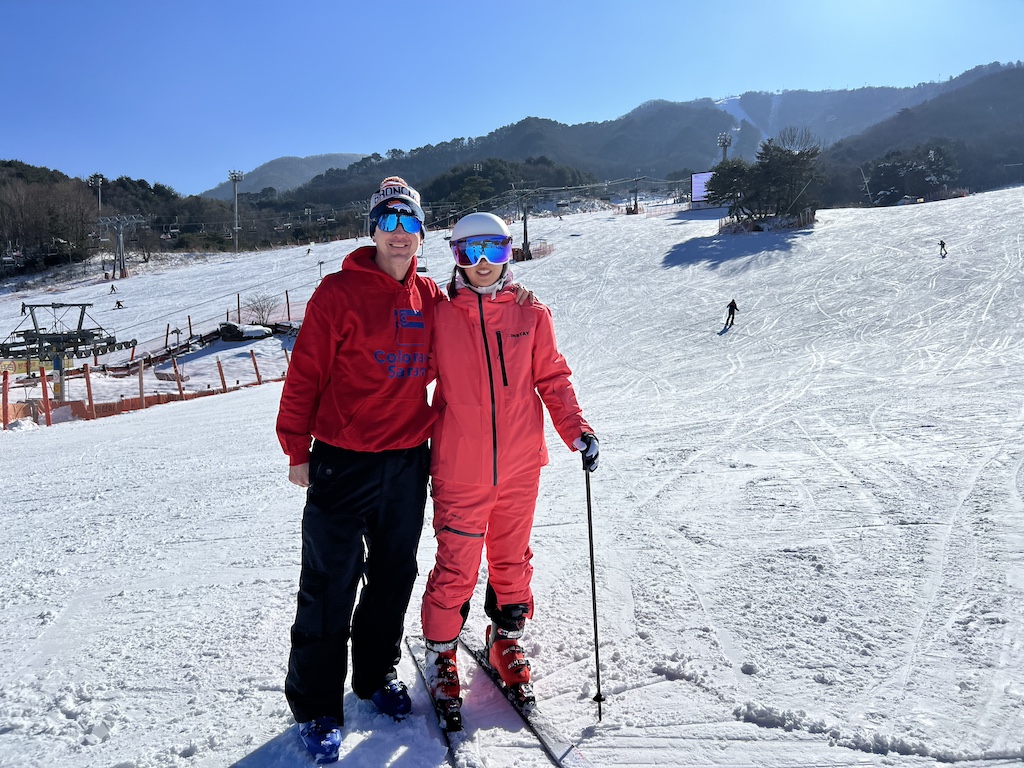
🏨 Where to Stay Near Muju Deogyusan Resort
Muju Deogyusan isn’t surrounded by a big ski village like Yongpyong or High1. Lodging options are a bit scattered and mostly consist of family-run pensions, small hotels, and guesthouses in nearby towns like Seolcheon-myeon or around Gucheondong Valley.
That said, there are a few good options if you know where to look.
For a wider range of pensions, Klook actually has a more useful listing than Booking.com in this region. Their selection includes ski-friendly stays within a short drive of the resort, often with better pricing and local hosts.
👉 Browse Muju pension listings and local stays on Klook →
If you want to compare options, Booking.com lists a handful of places in the Muju area.
One solid pick is Muju Deogyusan Resort Hotel, located right at the base of the mountain. If I didn’t live nearby in Daegu, this is probably where I’d stay. The location can’t be beat for early-morning laps and slopeside convenience.
🍜 Dining and Après Ski at Muju
Like most Korean ski resorts, Muju keeps things pretty simple when it comes to food. You’ll find the usual lineup of Korean fast-casual ski fare: gimbap, ramyeon, hot dogs, and pizza. Most of the dining options are at the Manseon Base Area, with a few additional spots like Heidi House and Seolcheonbong Restaurant higher up the mountain.
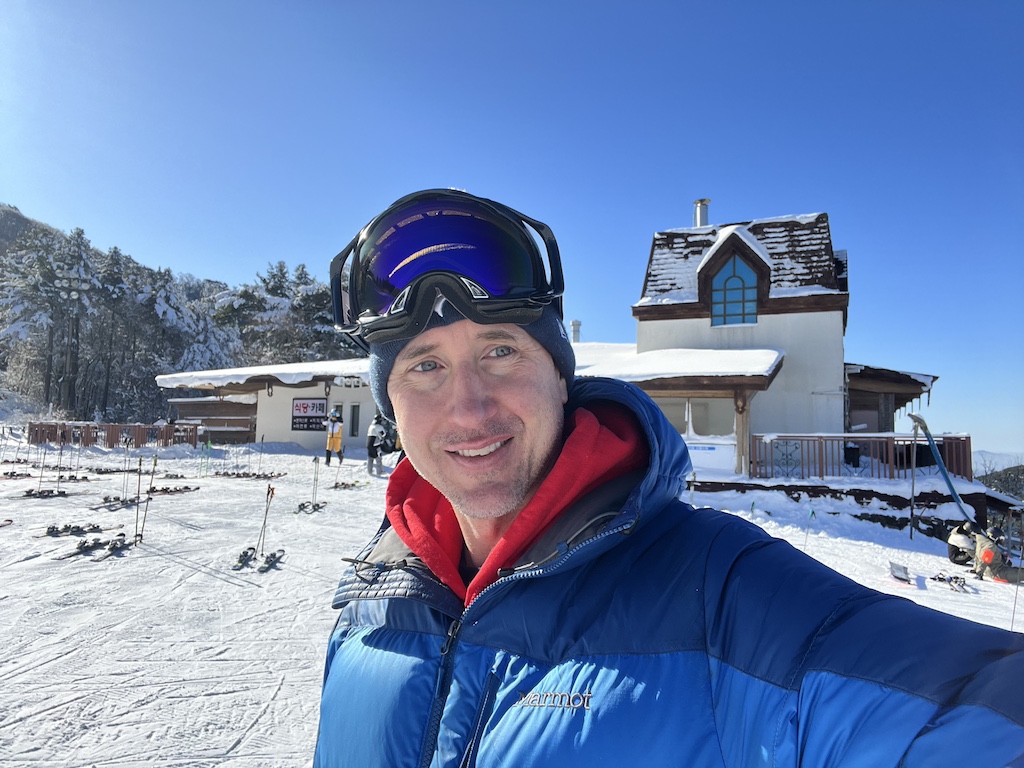
Prices are reasonable, especially compared to what you’d pay at Western resorts. Just don’t expect anything gourmet.
Après ski is quiet here. If you’re staying overnight, your best bet is to grab a few beers from the convenience store at the base or bring your own supplies for a relaxed night in. There are no bars, no live music, and no big nightlife scene.
If you’re driving and want a proper meal after skiing, I recommend Camp Brunch (캠프런치). It’s a casual café about ten minutes from the resort that serves a solid American-style breakfast. It’s also dog-friendly and sits next to a small river, which makes it a great spot to unwind and let your pup stretch their legs.
📍 Camp Brunch
1262-4 Gucheondong-ro, Seolcheon-myeon, Muju-gun, Jeollabuk-do
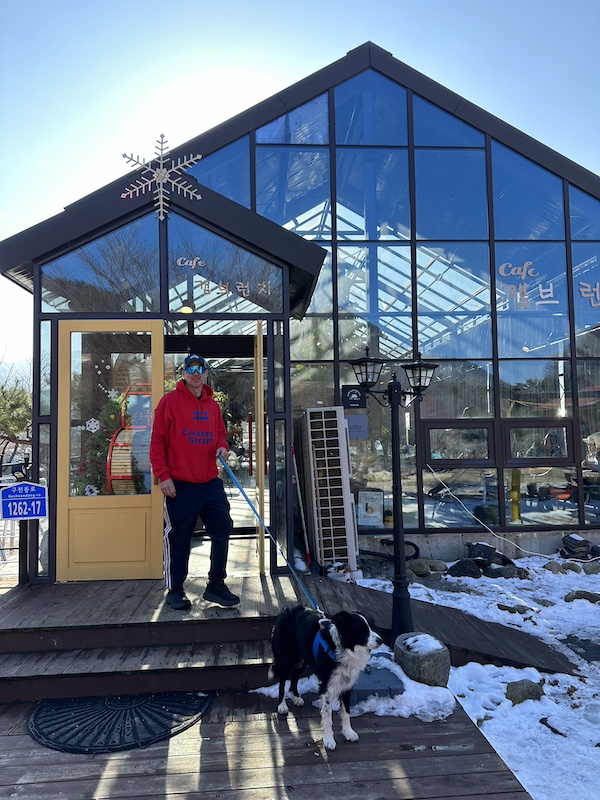
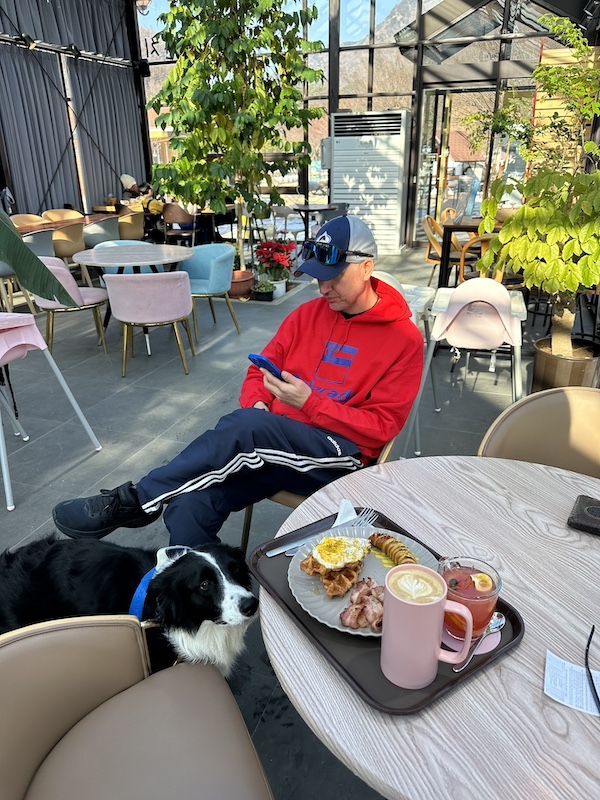
🎥 Highlight Video on TikTok
🎿 Final Thoughts: Is Muju Deogyusan Worth It?
When reflecting on my overall experience at Muju Deogyusan Resort, I kept coming back to a lyric from an old Gin Blossoms song:
“If you don’t expect too much from me, you might not be let down.”
Having grown up in Vail, Colorado, and lived in South Korea since 2007, I’ve learned to shift my expectations when it comes to skiing here. South Korea’s ski resorts will never match the scale or infrastructure of the Rockies or the Alps. But if you embrace the joy of getting out for some turns with friends or family, there is still a lot to appreciate.
Muju Deogyusan is no exception. For anyone based in or visiting southern Korea, it is a convenient way to get on the snow without driving far north. It is also more affordable than resorts around Seoul, making it a solid choice for a relaxed day trip.
That said, it is important to keep expectations realistic. Muju’s smaller size, limited open terrain, and dated lifts may disappoint advanced or expert skiers. Weekend lift lines can also get long when the upper mountain is open.
If you have the flexibility, larger resorts like High1 or Yongpyong offer more terrain, better facilities, and a more polished overall experience. But if convenience is the priority and you want a simple day on the slopes, Muju Deogyusan Resort can still deliver a fun outing as long as you go in with the right mindset.
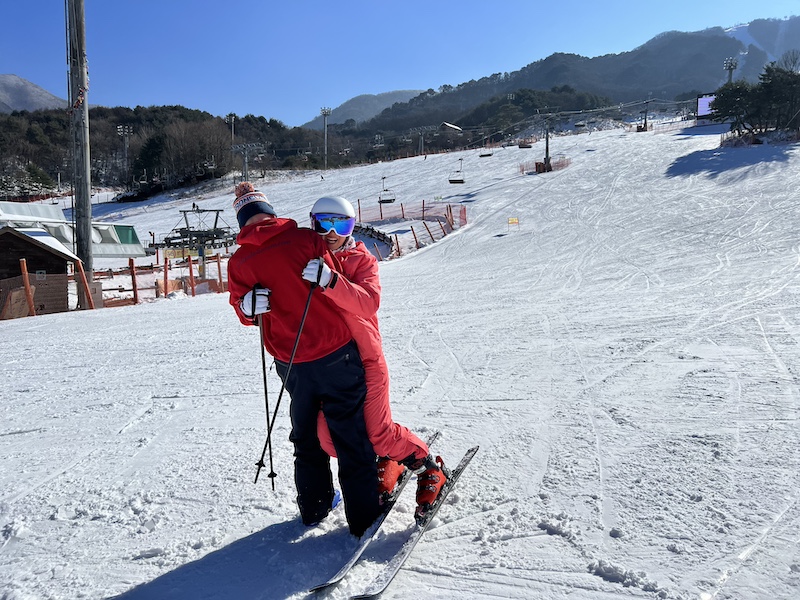
🙏 Support the Blog
This post is not sponsored by any resort, hotel, or brand. Some of the links here are affiliate links, which means I may earn a small commission if you book through them at no extra cost to you.
If you found this guide helpful and want to support the time and travel that go into keeping this site running, you can send a small donation through Buy Me a Coffee using the button below.
It is never expected, but it genuinely helps me keep sharing honest advice and firsthand stories from my ski trips, hikes, and off the beaten path adventures around Asia.
❓ Muju Deogyusan Resort FAQs (2025/26 Season)
When does Muju Deogyusan Resort open for the ski season?
The official ski season at Muju typically runs from early December to mid-March. However, terrain openings can vary depending on snow conditions and snowmaking. Early-season coverage is often limited.
How much are Muju lift tickets?
As of December 2024, adult lift tickets range from about 44,000 KRW to over 90,000 KRW, depending on the time block and where you purchase. You can often get better deals through rental shops in Seolcheon rather than at the resort base.
Is Muju a good resort for beginners?
Yes, Muju has a beginner-friendly zone at the Manseon Base Area, with a magic carpet and easy trails. It’s a solid option for learning or getting back into skiing.
Does Muju have rental gear available?
Yes. You can rent skis, boards, boots, helmets, and clothing either at the base area or from independent shops in Seolcheon-myeon. The quality at some town rental shops can be surprisingly good.
How crowded does Muju get on weekends?
Weekends can be busy, especially if the upper mountain is open. Expect longer lift lines and limited parking. Weekdays are usually quiet with more space on the slopes.
Is Muju Deogyusan Resort pet-friendly?
While pets aren’t allowed on the lifts or slopes, many nearby pensions and cafes are dog-friendly. Driving in with your own car makes traveling with a dog much easier.
👉 My complete guide to Yongpyong Resort: Expert Terrain, Lift Tickets, Rentals and Travel Tips
👉 My complete guide to High 1 Resort: Why I Keep Coming Back to This Mountain
👉 Welli Hilli Park Resort Ski Guide: Quietly Excellent Advanced Skiing in South Korea
👉 Skiing and Travel in Hokkaido, Japan
👉 Beyond Japow: My Search for the Next Great Ski Destination in Asia
👉 Why I’m Skiing in Gulmarg, Kashmir in 2026
🎒 Stay Connected and Keep Exploring
🧭 Need Help Planning Your Trip?
Not sure where to stay, how to compare lift passes, or whether renting a car makes sense? I offer free one-on-one planning support for independent travelers.
This is not a travel agency. It is just me, someone who has been living and traveling around Asia for nearly 20 years, helping snow enthusiasts sort out logistics based on real experience.
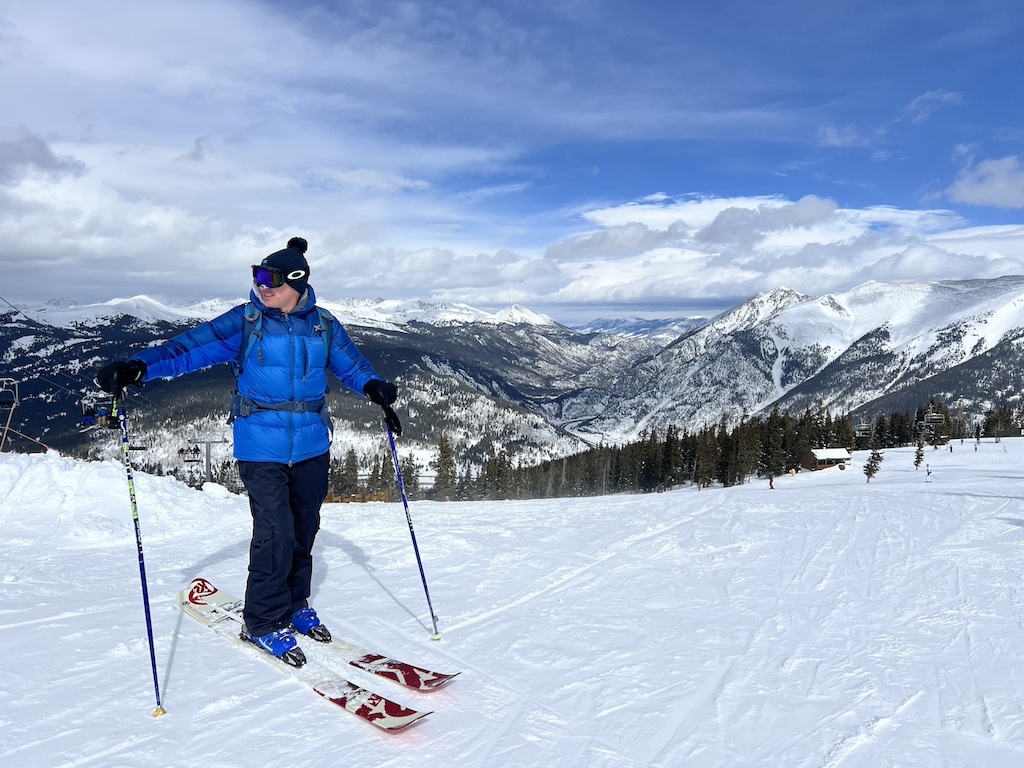
⛷️ Colorado Saram Apparel
Skiing in Korea has taught me that it can be hard to find ski themed designs that feel connected to the mountains here. So I began designing my own Korea inspired ski hoodies, shirts, and hats, along with the Japow themed line I created after several trips to Hokkaido.

